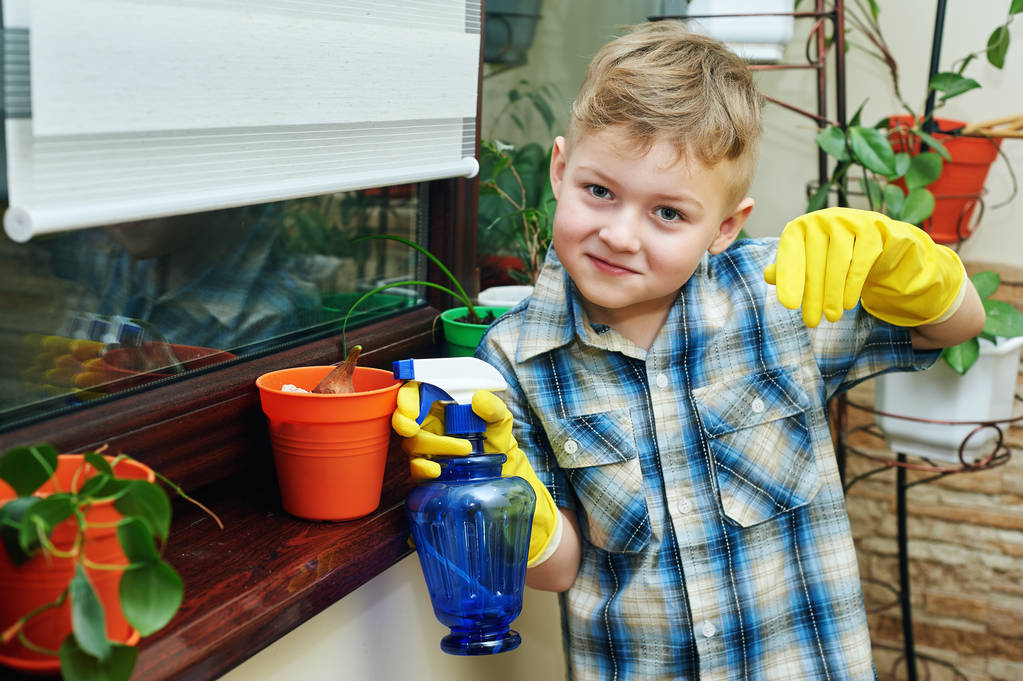Discover effective strategies and tips on how to teach household chores to 8-9 year old children.
How to Teach Household Chores to 8-9 Year Old Children
Teaching household chores to 8-9 year old children is an important step in their development. By involving them in age-appropriate tasks, you can help them develop responsibility, independence, and essential life skills. In this article, we will explore the importance of teaching household chores at a young age and discuss strategies for selecting chores, creating a chore chart, and making chores fun and engaging for your children.

The Importance of Teaching Household Chores at a Young Age
By involving your 8-9 year old children in household chores, you are empowering them to become responsible and independent individuals. This early introduction to chores helps build a strong work ethic and teaches them valuable life skills that they will carry with them into adulthood.
Developing Responsibility and Independence
When children are assigned household chores, they learn the importance of taking responsibility for their actions. By completing tasks such as making their beds or organizing their toys, they begin to understand the impact of their actions on their surroundings. This fosters a sense of ownership and accountability.
Moreover, involving children in household chores helps foster their independence. As they learn to perform tasks on their own, they gain confidence in their abilities and develop essential life skills that will serve them well in the future.
For example, when children are responsible for watering the plants, they learn the importance of nurturing and caring for living things. This not only teaches them about the natural world but also instills a sense of empathy and compassion.
Instilling a Strong Work Ethic
Teaching children the value of hard work from a young age is crucial. By involving them in household chores, you are instilling in them a strong work ethic that will shape their approach to tasks and responsibilities throughout their lives. This sets them up for success in various aspects of their lives, including academics, relationships, and careers.
Furthermore, when children contribute to the household through chores, they develop a sense of pride and accomplishment. They understand that their efforts are valuable and make a difference in the overall functioning of the family unit. This sense of purpose and achievement motivates them to work hard and persevere in other areas of their lives as well.
Building Essential Life Skills
Household chores provide children with the opportunity to learn various essential life skills. Through tasks such as cleaning, organizing, and doing laundry, they develop skills such as problem-solving, time management, and attention to detail. These skills will serve as a foundation for their future personal and professional lives.
For instance, when children are responsible for organizing their toys or tidying up their rooms, they learn how to categorize and prioritize items. This skill translates into better organization and time management in other areas of their lives, such as schoolwork or extracurricular activities.
In addition, doing laundry teaches children the importance of following a step-by-step process and paying attention to details such as sorting clothes by color and fabric type. These skills not only make them more self-sufficient but also prepare them for future responsibilities, such as managing their own finances or maintaining a household.
In conclusion, involving children in household chores at a young age has numerous benefits. It helps them develop responsibility and independence, instills a strong work ethic, and builds essential life skills. By teaching them the value of contributing to the family unit through chores, you are equipping them with the tools they need to become successful and well-rounded individuals in the future.
Choosing Age-Appropriate Chores for 8-9 Year Olds
When it comes to teaching responsibility and instilling a sense of contribution in your children, assigning age-appropriate chores is an excellent way to achieve these goals. Not only do chores teach valuable life skills, but they also promote a sense of independence and self-reliance. In this article, we will explore the importance of selecting suitable chores for 8-9 year olds and provide some practical suggestions.
Considering Physical and Cognitive Abilities
As your children continue to grow, their physical and cognitive abilities undergo significant development. It is crucial to take these factors into account when assigning chores. While 8-9 year olds are generally more capable than younger children, it is still important to choose tasks that match their strength, coordination, and attention span. Simple chores that involve light cleaning, organizing, and setting the table are suitable for children in this age range.
For example, you can assign your child the task of tidying up their room, which includes making their bed, organizing their toys, and folding their clothes. This not only helps keep their personal space clean but also encourages them to take ownership of their belongings.
Identifying Chores that Match their Interests and Abilities
One way to make chores more enjoyable for your children is by assigning tasks that align with their interests and abilities. By doing so, you can turn chores into a fun and engaging activity rather than a mundane responsibility. Take the time to observe your child’s hobbies and passions, and incorporate them into their chores.
For instance, if your child has a knack for creativity, you can involve them in tasks such as decorating their room or creating artwork for the refrigerator. This not only allows them to express their artistic abilities but also instills a sense of pride in their accomplishments. By making chores more enjoyable, you are more likely to foster a positive attitude towards responsibility in your child.
Balancing Chores with School and Playtime
While teaching children the value of chores is essential, it is equally important to strike a balance between chores, school, and playtime. As children juggle their academic responsibilities, extracurricular activities, and free play, it is crucial to assign reasonable chores that can be completed within a specified timeframe.
Creating a chore schedule or chart can help your child understand their responsibilities and manage their time effectively. By doing so, you can ensure that they have ample time for schoolwork, hobbies, and relaxation. This balance is crucial for their overall development and well-being.
In conclusion, selecting age-appropriate chores for 8-9 year olds is a thoughtful process that takes into consideration their physical and cognitive abilities, interests, and the need for balance in their daily lives. By involving your children in household tasks that are suitable for their age, you are not only teaching them valuable life skills but also fostering a sense of responsibility and independence that will benefit them in the long run.
Creating a Chore Chart and Routine
Establishing clear expectations and guidelines is crucial when implementing a chore system for 8-9 year old children. Creating a chore chart and routine can help your children stay organized and accountable for their tasks. Designing a visual chore chart and setting realistic goals and rewards will also motivate your children to complete their chores.
When it comes to creating a chore chart and routine, there are several key factors to consider. By taking the time to establish clear expectations and guidelines, designing a visual chore chart, and setting realistic goals and rewards, you can create a system that works effectively for your family.
Establishing Clear Expectations and Guidelines
Prior to implementing a chore chart and routine, have a family meeting to establish clear expectations and guidelines. This is an opportunity for open communication and collaboration. Discuss the importance of each chore and outline the desired outcomes. By involving your children in this discussion, you give them a sense of ownership and involvement in the process.
During the family meeting, encourage your children to share their thoughts and ideas about the chores they are assigned. This will help them feel heard and valued, and it may also lead to more enthusiasm and willingness to complete their tasks. Additionally, be sure to explain the consequences of not completing chores, as this will help your children understand the importance of their responsibilities.
Designing a Visual Chore Chart
A visual chore chart is an effective way to keep your children engaged and motivated. Create a chart that includes each chore, the responsible person, and the due date or frequency. You can use stickers or colorful markers to track completion. This visual representation of their progress will serve as a visual reminder of their responsibilities.
Consider making the chore chart interactive by allowing your children to customize it with their own artwork or decorations. This will make the chart more personal and enjoyable for them to use. Additionally, consider using a whiteboard or a chalkboard as the chore chart, as this will allow for easy modifications and updates.
Setting Realistic Goals and Rewards
Provide your children with achievable goals and rewards to motivate them to complete their chores. For example, you can offer a small reward after a certain number of completed tasks or establish a points system where they can earn larger rewards over time. Keep in mind that rewards should be age-appropriate and aligned with your family values.
When setting goals, it is important to consider the abilities and limitations of your children. Assigning tasks that are too difficult or time-consuming may lead to frustration and demotivation. On the other hand, assigning tasks that are too easy may not provide enough challenge. Finding the right balance will help your children develop a sense of accomplishment and pride in their work.
Remember to regularly review and adjust the chore chart and routine as needed. As your children grow and develop, their abilities and responsibilities may change. By keeping the chore chart and routine flexible, you can ensure that it remains effective and relevant.
Teaching Chores through Fun and Engaging Activities
While chores may seem like mundane tasks, there are ways to make them fun and engaging for your 8-9 year old children. By turning chores into games and challenges, incorporating music and dance, and encouraging creativity and imagination, you can transform chores from a dreaded activity into an enjoyable experience.

Turning Chores into Games and Challenges
Add an element of fun to chores by turning them into games and challenges. For example, you can time your children to see who can pick up their toys the fastest or challenge them to fold a pile of laundry in a certain amount of time. These friendly competitions will make chores more exciting and motivate your children to complete them efficiently.
Incorporating Music and Dance into Cleaning Tasks
Music has the power to uplift spirits and make tasks more enjoyable. Have a cleaning playlist ready and encourage your children to sing, dance, or groove while doing their chores. This can turn an otherwise monotonous task into a lively and fun experience.
Encouraging Creativity and Imagination while Doing Chores
Encourage your children to unleash their creativity and imagination while doing their chores. For example, you can ask them to create a story or pretend they are on a mission to clean a messy room. This imaginative approach will engage their minds and make chores feel like an adventure rather than a chore.
In conclusion, teaching household chores to 8-9 year old children is a valuable experience that promotes responsibility, independence, and essential life skills. By selecting age-appropriate chores, creating a chore chart and routine, and making chores fun and engaging, you can make this process enjoyable for both you and your children. Embrace the playful approach and watch as your children blossom into responsible and capable individuals ready to take on the world, one chore at a time!



